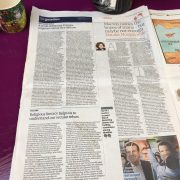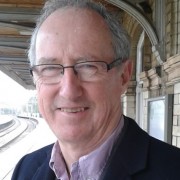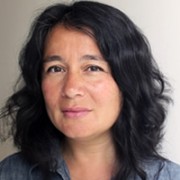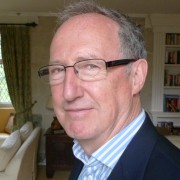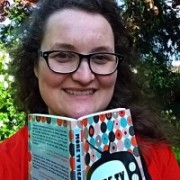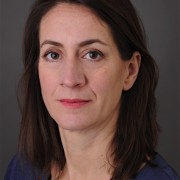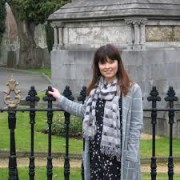The Problem with Choosing a Sandford Award Shortlist
/0 Comments/in Awards, General /by Roger BoltonThe Importance of Being a Children’s Broadcaster
/0 Comments/in Awards, General /by Frank Cottrell BoyceThe Sandford St Martin Trust has been making annual awards for the best radio and television programmes about religion, ethics or spirituality since 1978 – so, by comparison, our Children’s Award is still something of a youngster. Ah, but what a precocious and forward-thrusting youngster it is! Last year’s judging panel was chaired by the writer and broadcaster Frank Cottrell Boyce. Below is the speech Frank delivered on that night – both a celebration but also a passionate argument for the importance of children’s broadcasting.
“I’d like to begin by thanking my fellow judges Rachel Moseley, Anna Bassi and David Hallam because we had such a great time! We had such a great time judging this list. Not just because all the work on it was so impressive but because there was something really rejuvenating and moving about seeing just how much ambition and creativity and commitment people had put into making these films. Long running series like Newsround which you can see really upped its game to deal with the Hiroshima story. And those little films that you saw from True Tube – people had really kind of stretched. You could feel how much they had stretched their resources and their imaginations to help young people deal with those big, big questions. We saw animation and dramatisation and historical testimony: huge palettes of techniques being brought to bear on these questions.
“When young people engage with questions like immigration, sexuality and their own mortality and morality, they’re not puzzling over intellectual questions, they’re building their own identities. And in doing that they are building the future identity of this nation. So huge praise is therefore due to the BBC who, among all the broadcasters, absolutely – to use a teenage phrase – “owned” this shortlist. The absence of the commercial broadcasters from it, I think, is depressing – but also really dangerous. I’m going to follow the Archbishop’s lead in quoting Simon Schama who said that our society offers our young people two options: shopping or extremism. And if our cultural arbiters vacate the field on which our young people wrestle with the great questions, then other forces will step in. These are questions which have to be answered. And if we don’t help young people grapple with the complexity of those questions, then there are other people who will cheerfully come along with murderously simple answers. To leave a gap in the schedule around this area is to leave a hole in our nation’s heart.
“Having said all of which both the winner and the runner-up celebrated the resourcefulness, the resilience and, most of all, the kindness of children.
Our runner-up gave one of the most heart-stopping moments of television I’ve seen in a very very long time. In the clip you’re about to see, Ella has just completed a sponsored run for her Grandad who is suffering from Alzheimers.
“Tonight’s winner, just like the runner-up, comes from the world of scheduled television. I love my podcasts. I love YouTube as much as anybody and I think that iplayer is one of the great wonders of the world. But the downside of choice is that it can also lead us to create our own digital safe spaces – so, God bless the Radio Times. I was emotionally ambushed by Ella’s Grandad and our winner, too, did that thing that really only scheduled television does best of all, which is to make you really care about something you didn’t really think about that much before. To put a human face on a big political story – and what a face! A boy named Ahmed who has swagger, and insight and eloquence and, above all, a bicycle. So I’m really really delighted to announce that the winner of this year’s Sandford St Martin’s prize for Children’s broadcasting goes to My Life: The Boy on the Bicycle which was made by Drummer TV for CBBC’s My Life. “
When Religion Makes the News
/1 Comment/in General /by Ekene Oboko and Nana-Abwoa Mbeutcha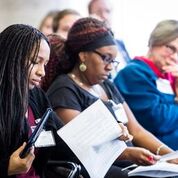
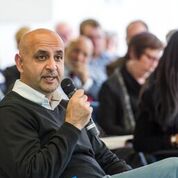
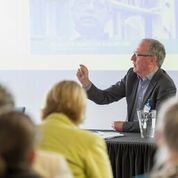
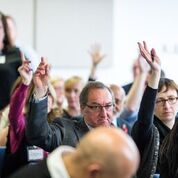
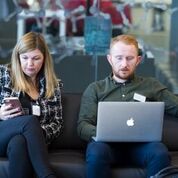
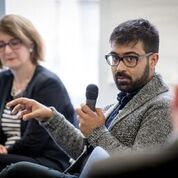
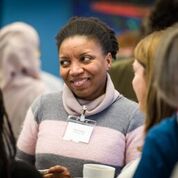
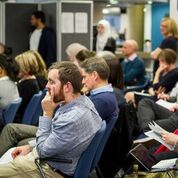 Images copyright of: Natasha Hirst @HirstPhotos
Images copyright of: Natasha Hirst @HirstPhotos
Whether it’s understanding the difference between Sunni and Shia, the background to claims of anti-Semitism in UK politics, or the popularity of “hate” preachers in the US and how they contributed to the rise of Donald Trump, religion plays a key role in many of the biggest news stories of our times. And so it goes without saying that modern journalists need to be religiously literate and aware.
On November 8th, Sandford St Martin trustee Roger Bolton chaired an NUJ Training/ITV Wales workshop for journalists: ‘When Religion Makes the News‘. This was a workshop and networking event for journalists and media representatives from various faith groups and the aim was to promote religious literacy by offering participants expertise, resources and the opportunity both to examine their own personal standpoints while honing their professional skills.
Among those attending the event were three very up-and-coming journalists who worked behind the scenes to support the 2016 Sandford Awards ceremony at Lambeth Palace. We asked them to both report on what happened and to share their thoughts on the conference’s theme. This is what they said:
Nana-Adwoa Mbeutcha: Producer and Presenter for Premier Christian Communications
“Religion is the single most important factor in our identity.” These were the bold words of Dr Jenny Taylor, CEO of Lapido Media, Centre for Religious Literacy in Journalism. Whether you believe that to be true or not, you can’t argue with the fact that religion ultimately determines why people think and behave the way they do, even subconsciously. Broadcaster Roger Bolton, who chaired the event, made the clear statement that you can’t understand the UK without knowledge of Christianity in this country.
Prior to attending ‘When Religion Makes the News’, organised by NUJ Training Wales, I knew that it made sense to know a bit about the religion you were broadcasting about, but as the day went on, I quickly realised how ignorant and naive I was to not realise that to report accurately, “we need a much more sophisticated understanding of faith” (Roger Bolton).
As the day progressed, both journalists and faith representatives heard from Media Representatives from three Abrahamic faiths and we were educated about Muslim life and communities in the UK by Innes Bowen, author of ‘Medina in Birmingham, Najaf in Brent: Inside British Islam’, and Hussein Kesvani, Head of Communications at Theos Think Tank. Who knew there were so many different branches of Islam present in the UK…? Such a simple, yet important, piece of unknown knowledge to many.
What was very enlightening was the “opportunity for self-scrutiny” that was given to the Journalists and Media Academics in an afternoon workshop. Regardless of religious beliefs, we all have a somewhat innate bias and a belief that can shape the way we report or perhaps what we even choose to report. “The Catholic Church is always so out of touch with reality…It’s not rocket science that condoms will stop the spread of AIDS in Africa” some may say. But research the communities a little deeper and remove your bias against the “out-of-date Catholic Church”, and you’ll realise that due to cultural practices and many other factors, not just the absence of condoms, AIDS is being spread. Not only do journalists show a lack of research when they fail to report accurately, we do injustice to those we are reporting to.
To round off the day, we heard from Aaqil Ahmed, Head of BBC Religion and Ethics, and Dr Michael Munnick, Centre for the Study of Islam in the UK. Dr Munnick covered areas such as Political Correctness, Religion in a Secular Society and Understanding what Motivates Religious People.
The event was such an eye opening experience about something that should be such a given. If you’re going to report accurately about a football team, its players and the way they are playing, you need to have real background knowledge about the history of the team and their players, to do a good and honest job. So why don’t we do the same when it comes to reporting about people and society? After all, you cannot separate belief from society.
Ekene Oboko, Researcher / Assistant Producer, CTVC
Along with politics and money, religion has been deemed an unseemly conversation topic at the dinner table. Within journalism, however, money and politics seem to be welcomed enthusiastically at different sort of tables. These tables are the newsroom desks staffed with dedicated political and economic news editors. Despite the inestimable value billions around the world place on their beliefs, and the role religion plays in shaping domestic and foreign affairs – constructive or otherwise – religion is treated, at times, like a distraction from the ‘real’ stories and is therefore downplayed or side-lined – denied a seat at the news desk. This is not to say that news or current affairs does not – to cite a former political press officer – “do God”. They do. The BBC’s commitment to religious programming testifies to that. But religion specialists argue that all journalists, where necessary, should have a deeper understanding of the role religion plays in global and domestic affairs, and also in individuals’ personal lives.
On Tuesday 8th November 2016, the National Union of Journalists in Wales and ITV Wales took on the challenge to promote religious understanding among journalists. The media organisations hosted “When Religion Makes the News” – a one day event held in Cardiff bringing together journalists, representatives from faith communities and broadcast researchers, like my myself, to promote religious literacy.
Roger Bolton chaired the event and in his opening commented that religion was often viewed as an “embarrassment” in society. He suggested that maybe this modern-day puzzlement over religion and those who hold religious beliefs had filtered into news reports, with some mainstream media stories bordering on ignorance when tackling religious issues. Following Roger’s thought-provoking remarks were a series of sessions jam-packed with engaging and informative advice, including a Q & A with the former BBC Head of Religion and Ethics, Aaqil Ahmed. The day also featured valuable networking breaks.
Highlights of the day included a session delivered by Dr Jenny Taylor, previously CEO of religious literacy organisation Lapido Media. She stressed that when journalists engage with stories of a religious nature, they need to be on guard to avoid feeding into the “dominant discourse” and perpetuating religious stereotypes. It’s imperative, she said, for news stories to reflect religion with all its “complexities”.
Press officers from Christian and Jewish faith groups revealed the challenges they have faced when attempting to engage journalists in stories related to their respective communities with reporters appearing to show interest only when the story might impact negatively on the faiths’ adherents. However, Maggie Doherty spoke on the positive media coverage she’d received for The Catholic church in England and Wales’ “The Art of Dying Well” campaign, a digital revamp of the fifteenth century manuscript, Ars Moriendi.
Attendees were treated to a fascinating talk by Innes Bowen, Current Affairs Editor for BBC Radio 4 and the World Service, on the Muslim communities residing in Wales. Former Buzzfeed journalist Hussein Kesvani, now communications consultant at religious think-tank Theos, delivered a detailed and fantastic talk on his experience covering religious affairs, particularly within Muslim communities. He urged journalists to look beyond reporting clichéd stories on Islam, not in aid of some kind of re-balancing exercise, but because they’d find powerful stories within Muslim communities.
The last session of the day was led by Dr Michael Munnik, a former religious correspondent on Canada’s public radio. His talk was targeted at journalists hoping to, or, currently covering religious affairs. For faith communities to trust and support news stories on religion, he said, journalists need to gain the trust of faith communities and “become a safe pair of hands”.
Not being a reporter myself, the most revealing contributions derived from journalists who were not religious correspondents. What came across loud and clear was their willingness to fully engage with the religious dimensions of their stories – unfortunately practical factors, such as deadlines and limited resources, sometimes mean it’s a challenge to explore those stories’ religious elements extensively. Rather than denying religion a seat at the table, it seems journalists, despite wanting to, don’t always even have the time to look for a chair.
You can find out more about When Religion Makes the News by reading blogs from organisers Angela Graham and Anna Wynn Roberts.
And our thanks to Natasha Hirst @HirstPhotos who took the photographs of the event attached to this blog. You can find out more about her work here.
Not sure you’ve got what it takes to win a Sandford St Martin Award in 2017? Read this…
/0 Comments/in General /by Anna McNamee
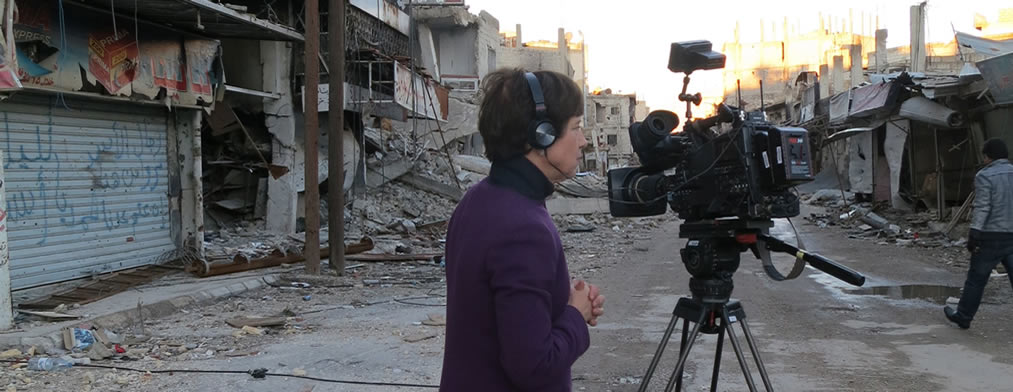
I’ll never forget the first ever conversation I had with the nervous man who would end up editing a series of documentaries about religion I was making.
“Nice to meet you”, he said before apologising, “I’m afraid I’m not very religious.”
“Not religious” I replied, “or not interested in religion.”
Because, while I can understand why people might make a connection, they’re not exactly the same thing are they?
And yet, years later, I still find myself having versions of the same conversation with colleagues. Which surprises me because how can a journalist, documentary or factual programme-maker NOT be interested in religion? What a person believes – or doesn’t believe – so often directly informs the decisions they make, the places they live, the people they know, who they vote for, what they’re willing to fight for, how they identify their sense of ‘self’ even, sometimes, the football team they support.
Open any newspaper and whether it’s a story about how evangelical churches and the right-to-life movement helped secure the presidency for Trump, fears of how anti-Semitism has infected UK party-politics, a story about why ISIS have been targeting Yazidis or why so many North Nigerian schoolgirls remain in captivity, religion matters. And these stories cannot be properly told or understood unless the people who are reporting on them properly consider religion.
And if you need any further proof that religion is interesting, just have a look at the programmes that were shortlisted and what went on to win last year’s Sandford Awards.
There were programmes about the big stories like the war in Syria or the European refugee crisis, but smaller, more personal stories, too, about coming out or the death of a loved one. What all these programme had in common was that none of them shied away from the fundamental journalistic questions: Who are we? How do we identify our place in the world? What do I believe or choose not to believe? And how has this informed the life I live? Questions bound up with religion, ethics, morality, spirituality, call it what you will – they’re all interesting.
Fortunately for me (not to mention the broadcaster we were working for), it turned out that nervous editor was, in fact, very interested in religion. And, if I dare say so myself, we made some good, thought-provoking, timely programmes together.
So… What about you?
Have you made a great programme that explores some of those fundamental questions? If the answer is ‘yes’, then you should probably enter for an Award.
And: are you interested in religion?
If so, then you’ve probably got what it takes to win one.
Is Religious Broadcasting Fit for Purpose?
/0 Comments/in General /by Roger BoltonIt’s been a tumultuous year for the BBC. What with BBC Charter renewal and the government’s proposed “major overhaul” of how the nation’s broadcaster is run and regulated, rumours about the future of in-house production, digital platforms and fears over the practicality of the BBC licence fee – the BBC’s is being forced to articulate it’s vision for the future. So where does religious broadcasting fit in? And how seriously do BBC managers take religious literacy? Roger Bolton is the presenter of BBC Radio 4’s “Feedback” programme and a Sandford St Martin trustee. In his blog, below, a version of which was first published on the Royal Television Society’s website, he argues that if the BBC and other broadcasters don’t improve their coverage of religion, they’ll be missing out on modernity.
“My generation grew up thinking that religion was completely marginal to British life, which, as for the rest of the world, has been proved more and more wrong”. Simon Schama, historian.
In this, if in little else, Mr Schama and I have something in common. Born in the same year, I was also carried along on the wave of 60’s optimism which assumed everyone was basically good, life was getting better for all, and reason would triumph. As an historian, and a Jew, Simon Schama of course knew this was an illusion, yet even he misread the importance of faith in the modern world.
When I became a BBC journalist I was encouraged to read books about subjects like Ireland and the trade unions and learn about the City. No one ever mentioned the Shia/Sunni split. Indeed in 1979, when Ayatollah Khomeini returned to Iran after exile, I did not know which branch of Islam he belonged to or why it mattered so much. (Shia, since you ask, and what followed his return was the Iranian Revolution, the Iran-Iraq war and just about everything that has happened in the Middle East since.).
Today religious literacy is vital for everyone involved in broadcasting.
ABROAD
Lyse Doucet BBC News’ chief international correspondent says this. “Sadly, distortions of religious belief and texts are used as political weapons in many conflicts as well as clashes over traditional beliefs and practices. That requires us to know more about the tenets of major religions and systems of belief, to be able to assess and analysis different interpretations”.
In the Sunday Times the journalist A A Gill wrote, “Religion has never been more tangible in world affairs and public life. Not having more sensible and serious religious broadcasting isn’t modern, it’s a failure to face modernity”.
In June this year, in a keynote speech at the 2016 Sandford St Martin Awards at Lambeth Palace, the Archbishop of Canterbury, Justin Welby, called on the BBC to treat religion “with the same seriousness as other genres like sport, politics, economics or drama”. He went on, “The promotion of religious literacy should be a specific duty for the BBC across its broadcasting services”.
The BBC has six public purposes set out by Royal Charter. For some of us the promotion of religious literacy ought to be a seventh such purpose.
HOME
Such literacy is not only necessary to understand the world beyond our shores.
Christianity made this country. It is impossible to understand fully our politics and our culture, painting, sculpture, poetry and drama, indeed our new Prime Minister, without understanding the Christian faith.
And it impossible to understand the country we are becoming without understanding the beliefs of those who have immigrated here. The 2011 census recorded that there were 2.8 million Muslims in Britain, or 4.4% of the population. (Those figures will have increased in the last 5 years.) For many, perhaps most Muslims, their faith is the most important thing in their lives. How must they regard journalists who know little of their most cherished beliefs and who do not have the knowledge to challenge those who distort their faith?
So, how well are we broadcasters doing?
THE RECORD
The picture is decidedly mixed. There are some cracking programmes being made, as the shortlist for this year’s Sandford St Martin Awards showed, but fewer of them. Entries were welcome from news, current affairs, factual, arts, music, drama, children’s and comedy genres – as well as from teams producing specifically “religious” commissions. This year’s TV winner was “My Son the Jihadi” made by True Vision Productions for Channel 4 . In 2011 Sally Evans made a devastating discovery: her son Thomas had left their home in a Buckinghamshire village and travelled to Somalia to join a deadly Islamist terrorist group. The film charted, with immense sensitivity, her subsequent attempts to understand what had happened to her son and to come to terms with his death. Had it been better if he had never been born?
The Radio Times Readers’ award went to a very different sort of programme, BBC1’s “Call the Midwife”, and the Trustees award to Joan Bakewell for her lifelong commitment to ethical enquiry in programmes like “Heart of the Matter” and “The Ethics Committee” which enabled her to explore, with judicious impartiality, the most interesting ethical dilemmas of our age.
But if the quality is high the volume is getting lower.
Take Channel 4. According to OFCOM, its spending on religious broadcasting dropped from £49 million in 2008 to £20 million in 2013 (the latest figures we have). This period coincided with Channel 4’s decision to dispense with the role of Commissioning Editor for Religion and the elimination of any religious programming quota.
At ITV the position is even worse. Spending on religious programme commissions dropped from £40 million in 2008 to £2 million in 2013. (Yes £2 million.)
So much therefore depends on our main public service broadcaster, the BBC. How well is it doing?
THE BBC
It makes some good programmes, and has outstandingly well informed journalists like Lyse Doucet and Ed Stourton, but it seems to have little or no strategy, is in an organisational muddle, and seems to place religious broadcasting well down its list of priorities.
This may be a harsh judgement, and it would be wonderful if the BBC would produce the facts to contradict it, but consider the following, worrying, evidence.
(a) OFCOM described religious programming as one of several “immediate issues” of concern in its July 2015 report “Public Service in the Internet Age”. The reference was highlighted in the BBC’s own Charter Review report of September 2015, “British Bold Creative: the BBC’s programmes and services in the next Charter”. But the 99 page Corporation document made no further reference to religion – the only programme genre of “immediate issues” which got no mention in its proposals for the next Charter period.
(b) Aaqil Ahmed. officially the BBC’s Head of Religion and Ethics, has had his commissioning power taken away from him. TV religious programmes are now commissioned by a non specialist responsible for several other genres, science, business and history.
(c) In BBC News there are Editors for a vast range of areas including consumer affairs, the arts, and sport as well as politics and economics and a host of others. Religion does not have such a senior figure able to influence editorial policy, and its correspondent has to make do with a part time producer, though that may change.
QUESTIONS FOR THE BBC
In the light of this apparent vacuum, the Sandford St Martin trust has been trying to get answers from the BBC to three key questions.
- Who will take overall responsibility in the BBC for the range, quality, and quantity of religious coverage?
- Are BBC commissioners and programme makers issued with specific objectives or goals aimed at helping ensure informed coverage of the range of religious beliefs and practices in the UK?
- Regarding BBC news, does the BBC agree that in order for good journalism to flourish in this sensitive but crucial area, the same resources and expertise are necessary as in other areas? If so why is there no Religion Editor?
Perhaps the BBC has detailed answers to these questions. If so, could they let us know?
What I learnt watching telly for @sandfordawards
/0 Comments/in General /by Bryony TaylorFor 2016 the Sandford St Martin Awards have benefitted from the expertise and enthusiasm of a particularly distinguished group of judges and short-listers. Bryony Taylor, the author of ‘More TV Vicar‘ (a book that gets under the dog-collar of some of the best known religious characters on television) and a curate in Durham is one of them. Such is her dedication to duty that she not only cheerfully watched each and every TV programme entered for an award this year but she agreed, in the run up to the Awards ceremony on 8th June, to share with us (and you) some of her highlights. Our deepest thanks to her and her fellow adjudicators. This blog first appeared on her own website where you can find out more about Bryony and her work.
This year I was invited to help shortlist for the Sandford St Martin Awards – an awards scheme for excellence in broadcasting that engages with religion, ethics or spirituality. The shortlisting process involved watching a lot of television (obviously) that covered themes as wide ranging as Joan of Arc, Muslim Drag Queens and Srebrenica.
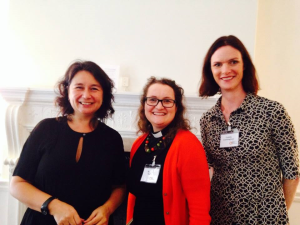
I think broadcasting that covers themes of religion, ethics and spirituality is only going to become more important in our current times. You have only to see some views espoused on social media or down the pub about religion and belief to realise how ill-informed most people are (and I include myself in that). Despite the decline of print media and even the decline in live television viewing – most of us still consume a lot of television – we simply do this via catch-up now or streaming services or saving up for a box set. Levels of religious literacy in particular are at an all time low, we don’t even understand our own religious background (which floats around like a ghost in the back of our mind with a refrain of ‘he who would valiant be’ from Primary School) – let alone understand what makes a Muslim tick. Most people wouldn’t get the ‘Blessed are the Cheesemakers’ joke from the Life of Brian any more – or at least wouldn’t be able to say where the joke comes from in the Bible. So we need good religious broadcasting. We need to understand the ‘other’ better in our world of angry tweets and incendiary Facebook posts.
Fascinatingly, a lot of the programmes I watched for the shortlisting were about extremism – either Islamic extremism or forms of fascism and white supremacy. Whilst I found these quite interesting, they didn’t teach me anything new, but perhaps even hardened my view on extremism.
The programmes I found most affecting were those in which we saw ordinary people trying to live out their faith. I particularly enjoyed the Irish documentary series ‘Baz the Lost Muslim‘ about a man who had grown up in Catholic Ireland with a Catholic mother but Egyptian Muslim father who decided to explore the faith of his father for the first time at the age of 40 – he had some profound moments along the way – particularly the first time he prayed.
Another wonderful programme was a short film about Muslim style vlogger Nabiilabee meeting with ex-Girls Aloud singer Nicola Roberts – they were sent on a mission to buy each other an outfit that worked with their own preferences – of course with modesty for the Muslim woman. This is a lovely programme which you can watch here – I particularly loved hearing Nabiilabee talking about ‘bad hijab days’! This was a really honest conversation about clothes and religious beliefs.
Another programme which showed the levels of diversity within a big religion like Islam was Muslim Drag Queens. Initially the provocative name put me off but this was a very moving documentary. The most striking part for me was when one more seasoned drag queen was teaching a new lad some moves in a night club (during the day). It came to prayer time and the younger lad was going to take his prayer mat into the corner to say his prayers. The older drag queen was horrified that his friend was happy to pray in such a place. It was fascinating – the discussion was not about their sexuality or the fact that they were drag queens but about their faith and how they live it out in Western Society. This was such a refreshing surprise – I’d love to see more programming like this. You can watch the programme on All 4 here – don’t let the title put you off!
My favourite programme which sadly wasn’t shortlisted ultimately (but got top marks from me!) was You, Me and the Apocalypse. This was a drama shown earlier in the year on Sky1. It is the most innovative drama I have seen in a long time. It benefits from having very high American drama production values and a very witty British script with a mixture of British and American actors. I think the reason it wasn’t shortlisted was that we shortlisted individual episodes, not whole series, and this is a series that really needs to be seen in its entirety and not one episode in isolation as the plot is complicated. The series is by turns hilarious, profound and moving and generates plenty of questions in the viewer. In my view it would be a great programme to watch over a few weeks as a small group from church or even as an adult confirmation course! The premise of the programme is that there is a meteor coming that will destroy the planet in 30 days and it tracks the response of a variety of characters in the UK and USA and other places whose stories begin to connect as the series progresses. I really recommend it and I was disappointed it didn’t ‘make the cut’ so to speak so I will sing its praises here!
I have only written here about a few of the programmes I watched. I thought it was a sad indictment of our times that so many were focused on the negative things to come out of religion or extremist beliefs. I hope that programme makers might look a bit more in the future at the more human stories of people working out what it means to live out their faith in the modern world as it is these stories we need to hear more. We all know what happens when religion goes wrong – we have the news for that – but drama and documentary makers have the opportunity to report on the real lives of believers and the complexities of being a person of faith – that is far more engaging and interesting!
If you want to know more about “More TV Vicar? Christians on Telly, the Good, the Bad and the Quirky” you can listen to an interview with Bryony here.
All party parliamentary group on religious literacy in the media
/0 Comments/in General /by Iftikhar KhanIn early May, an All Party Parliamentary Group on Religious Literacy in the Media was launched at Westminster with a round-table discussion moderated by the Sandford St Martin Trust Chair, the Rt Rev Nick Baines, Lord Bishop of Leeds. Among those also participating in the event was Iftikhar Khan one of the founders, a CTO and futurist at Alchemiya Media. What follows is his report for MuslimView and was first published on their website.
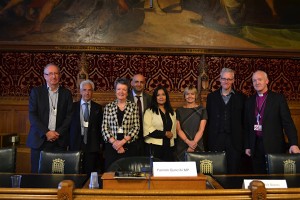
WEDNESDAY, MAY 11TH, 2016
Yasmin Qureshi MP for Bolton South East launched the All Party Parliamentary Group on Religion in the Media with a round table session held at the Palace of Westminster on Wednesday 4th May 2016.
The stated aims of the APPG are to work for greater religious literacy in the media and political spheres, to foster a better understanding and representation of religion in coverage of news and culture, recognizing the priority of religion as a prime motivator for individuals and communities in the country. The APPG aims to encourage more diversity in media representation of religion. Also, under the public service broadcasting remit of the BBC and Channel 4, it will advocate the inclusion of a commitment to promote religious literacy.
Lord Baines (the Bishop of Leeds, and Chair of the Sandford St Martin’s Trust) very ably and engagingly moderated a panel discussion between several high profile speakers. Aaqil Ahmed, the Head of BBC Religion and Ethics spoke of the changing demographics within certain parts of the UK that, tied to underrepresentation and a lack of media understanding have led to troublesome coverage, for example the Trojan Horse issue in schools in Birmingham. An ignorance of the nature of more conservative views as in this instance will only lead to more entrenchment of withdrawal and isolation from society, rather than fostering understanding. Aaqil estimated that there is a 5-10 year window of opportunity to ameliorate this before the issue becomes of greater concern with the current status quo of mutual suspicions is unacceptable.
Roger Bolton, the former BBC Editor and Presenter (‘Sunday’ on Radio 4) noted that the default stance and credo in most mainstream journalism in the UK is of liberal secularism. He also provided figures showing that the budget for religious programming on ITV declined from £40M to £2M in the five years to 2013, and likewise from £40M to £20M on Channel 4; Channel 4 no longer has a Commissioning Editor for Religion.
Academic Dr Abby Day, the Research Director of the Religion Media Centre at Goldsmiths College opined that every newsroom should have at least one religion expert, and that a core element of all media studies courses should cover religion. There should be exchanges between religious media outlets and the mainstream media. Dr Day gave the regretful example of the Sun ‘newspaper’ carrying out a scientifically unrigorous survey that led to the front page headlines of ‘1 in 5 Muslims support terrorism’ and the subsequent tiny apology buried and hidden deep within the paper after censure by IPSO.
Dr Jenny Taylor of Lapido Media gained her doctorate studying the sociology of religion and in particular the migration of Muslims. She declared that the world is full of religion and that the religiously unaffiliated in the world population will decline from 16% to a projected 13% by 2050. Misrepresentation and bias in the western media does not reflect the way that religion shapes allegiances in the rest of the world. Dr Taylor also quoted Bernard Levin who observed that in the British language, “vicars” rhymes with “knickers” and that this (unconscious) word association leads to ambivalence in attitudes to organized religion in this country.
Sir Alan Moses, the Chairman of IPSO, and a lively orator, regretted the “unattended ignorant depiction of what communities in this country believe”, and that while the BBC and Channel 4 have a statutory obligation of public service broadcasting, the policies and regulation of the press is determined by a set of standards set by the editors themselves, and that this may not always coincide with the public interest. He also stated that he wished there was much more “intelligent and compassionate” discussion of faith in the media.
Finally, the historian and author Tom Holland mused that the broad consensus in the media reflects the automatic assumption that ignorance about religion is a source of pride. This narrow viewpoint ignores the fact that religion is a vast spectrum of opinion. Holland also noted that secularism is not religiously neutral, but is rather a Christian concept, mediated through Christian theologians and Popes, and hence we refer specifically to a separation of Church and State rather than as a general synecdochical term.
There followed a brief and spirited question and answer session from the floor, including opinions from various journalists and broadcast professionals and from Baroness Elizabeth Berridge and Martin Vickers MP who both sit on related committees, and Baron Idarjit Singh of Wimbledon (and regular contributor to Radio 4’s Thought for the Day) decrying the lack of representation on the panel of anyone from the non-Abrahamic faiths. Yasmin Qureishi MP did counter this point by pointing out that this was not by design, and that as a kick-off meeting, there was limited time in this session, and that in future there would be fairer representation to those of all major faiths.
It is to be hoped that the APPG builds on the objectives and aims declared in this inaugural session with the same unified approach to foster better representation and understanding of religious life within society through more accurate representation, and wider coverage.
Both MuslimView and Alchemiya welcome and are supportive of these developments as this is also one of the aims of both organisations to be a source and a resource for religious literacy concerning Islam and Muslims in political circles as well as in the media.
How To Judge a Sandford Award Winner
/0 Comments/in General, Uncategorized /by Penelope SolomonSandford St Martin Award shortlisters and judges are chosen for their wide experience of both religion and the media. They include experienced producers, programme-makers, directors, journalists and critics from a variety of faith backgrounds. In 2016 the comedian and Radio TV critic, Penelope Solomon, was one of the those who was given the daunting task of shortlisting our radio entries. Over the past few years, radio has been the Awards most competitive category. This year more than 90 radio programmes were in the running for prizes. In her blog, Penelope reveals more about the process and some of the highlights for her.
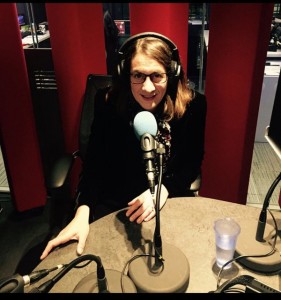
I WAS A SANFORD ST MARTIN AWARD SHORTLISTER
As a television critic, I like to select and compare programmes across different genres covering a range of topics. This helps to keep the viewing varied and interesting both for me and, hopefully, for my audience when I come to discuss the programmes live on air. For example I might watch a stand-up show like ‘Stewart Lee’s Comedy Vehicle’ and then contrast this with a documentary programme such as ‘Bedlam’ about mental illness in a psychiatric hospital in South London. (Some might argue that these two programmes are very closely linked, but that’s a subject for another blog!)
When I was invited to be on the shortlisting panel for the Sandford St Martin Awards, I was slightly daunted at first by the fact that I would be required to listen to a fair share of the almost eighty different radio programmes entered in the category and united by a common theme: religion, ethics and spirituality. Whilst I am interested in programmes which have a religious content, I thought the process might be a bit repetitive and dull. In truth, I didn’t really know what to expect. How delightfully surprised I was by the sheer range on offer from drama to documentary to live performances and church services. There was even a small selection of live Nativities!
Such was the diversity of voices, that contributions ranged from young Muslim women from Birmingham talking about wearing the hijab and fashion, to Jewish people ‘making Aliyah’ (i.e. emigrating to live in Israel) to an analysis of the Archbishop of Canterbury’s turbulent childhood. Questions around identity were a common theme in many programmes with different religious practices presented and issues affecting people from all walks of life, some who had faith and some with no faith. Some of the stories told were so gripping and evocative they brought tears to the eyes.
When a programme really works you can’t or indeed don’t want to stop listening. Strong resonant voices draw you into a carefully crafted story and somehow a connection is made which makes you want to keep on listening. During my listening I’d often find myself drawn in by programmes about topics I knew nothing about. When these stories were told well – through engaging contributors, a fresh approach and seamless editing – the result was extremely effective. I gained knowledge about different cultures and different ways of life and felt enriched and broadened by this new learning experience.
Music was a powerful and effective device used creatively in many of the programmes. Sometimes it was woven into the piece to break up or punctuate the narrative. At other times it was used to enhance meaning and emphasis within a story, to build up suspense and increase the tension. Stirring soundscapes were used to accompany chilling and harrowing stories. Occasionally music was over-used and became intrusive and distracted from the rest of the content, but this was rare. In some programmes the music and songs were so bold and stirring that I wanted to go out and buy the CD – if there had been one!) And then, there were other programmes which did not have any accompanying sound-track at all. It was interesting to note that some of these were equally as effective if not even more effective in engaging the listener. In these programmes it was the solitary voice and the spoken word which resonated and created an impact.
Several of the programmes explored current issues and contemporary themes such as same-sex marriages, religious fundamentalism, the radicalisation of young Muslims, freedom of speech or interfaith marriages and the fusion of eclectic family traditions. And the more I listened to these, the more I was surprised by how they stimulated my desire to discover more about other cultures, communities and religions and by how fascinating this learning was. I came away from the experience with a sense that I had touched upon some of the key issues that affect the lives of others and how important it is that this knowledge and information is shared.
In the end, my fellow shortlisters and I ended up with a long-list of fourteen excellent programmes which we then had to narrow down too a short-list of eight. We all had our favourites but after much analysis and discussion managed to agree in the end.
What strikes me on reflection is that there were hardly any comedy entries. Why is that? Is religion not funny? Are writers, producers or commissioners afraid to make jokes about Faith? Perhaps this is something for programme-makers and potential entrants to think about for next year.
You can read a full list of the programmes shortlisted for a 2016 Sandford St Martin Radio Award here.
Penelope is a Comedian and TV Critic for BBC Radio 4 (‘World Tonight’, ‘Today Programme’) and BBC Radio London.
As a performer credits include ‘Goodnight Sweetheart’ (BBC), ‘Fist of Fun’ (BBC), Sony Nominated ‘King of the Road’ (BBC Radio 2) and ‘Redeeming Brian’ by legendary sitcom writer David Nobbs (BBC Radio 2). She created and co-wrote ‘Tower of Bagel’ (Soho Theatre, Royal Festival Hall). Penelope has also performed live at: Theatre Royal Winchester, Royal Exchange Theatre, Manchester, Salisbury Playhouse, Bristol Old Vic and The Hackney Empire.
Penelope will preview her new live solo show at LEICESTER SQUARE THEATRE
on Saturday 16 July at 20.30
before heading to THE STAND COMEDY CLUB part of the EDINBURGH FRINGE 2016
You can find out more about Penelope and her work on her website: www.penelopesolomon.com
or by following her on Twitter: @aHackneyMum
One Million (and one) Dubliners
/0 Comments/in General /by Aoife Kelleher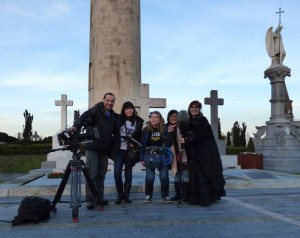
The winner of the 2015 Sandford St Martin TV Award was RTÉ’s beautifully shot, very moving film “One Million Dubliners” directed by Aoife Kelleher and produced by Rachel Lysaght of Underground Films. Being about a cemetery, the film inevitably deals with death but ultimately it’s a film about so much more: it’s about life, how to live, community, history and how individuals reconcile (or don’t) the past with their present. In those respects and many more, One Million Dubliners was a more than worthy winner of the Sandford St Martin prize and we’re pleased we were able to celebrate it for its achievement. But even better: it was an honour to be able to share in the lives of the people featured in the film as a member of its audience.
Aoife Kelleher writes:
When I first told people that I was making a documentary film about Glasnevin Cemetery, opinions were divided. Some agreed that cemeteries were beautiful, peaceful and fascinating places – the backdrop to stories of love, faith, passion and heroism – and would be an ideal setting for a documentary. Others found the idea a little too dark and sombre. And of course, in any film about a graveyard, darker subjects – such as death, separation, loss and despair – have to be explored. But in making One Million Dubliners, my aim was always to retain a sense of light, hope and humour; to convey the experiences of those that work in and visit the cemetery and the events and emotions that have brought them there. Ultimately, I hoped that the film would illustrate that, as James Joyce put it in Ulysses: “in the midst of death, we are in life.”
For producers and directors who have never worked in the area, the idea of religious programming might also seem a bit forbidding. There might be a sense that one would be confined to a particular set of issues; limited to a tone of weighty gravitas and that the only suitable contributors would be people of profound faith. In fact, I have found the experience of making One Million Dubliners, which was commissioned and supported by RTÉ Religious, hugely liberating. In making a film about a graveyard that was founded by Daniel O’Connell for those “of all religions and none”, I was permitted to ask a wonderful variety of participants the big questions about life, death and devotion. Whether or not we have faith, a sense of spirituality or a strong religious belief, we are all grappling to understand our place in the universe, the meaning of it all. I believe that every individual has a unique attitude to life and death, which is what makes the subject so intimate, so sensitive and so compelling. In One Million Dubliners, the customs, expressions and even the beliefs of the bereaved vary entirely from person to person and from circumstance to circumstance. By exploring such a wide variety of attitudes in the film, we created a space for our audience to think about their own opinions and rituals, to question them, to affirm them or to doubt them. The ability to create such a space, though not unique to religious programmes, is certainly one of its great possibilities.
We were delighted to be shortlisted for the Sandford St. Martin Trust Awards and absolutely stunned to have won the Television Award. It is particularly exciting to think that we are part of a community of programme makers across Ireland and the UK, who are addressing these essential themes, while also coming up with new ways to engage with them. We very much look forward to discovering this year’s nominees and their work.
You can watch a clip of One Million Dubliners here.
Read more about the team who made One Million Dubliners here or about Underground Films here.
CONTACT US
Sandford St Martin Trust
Church House
Great Smith Street
London
SW1P 3AZ
Email: info@sandfordawards.org.uk
Tel: 07749875477
Recent blog posts
- A Letter from Ukraine February 4, 2025
- Reflecting the Nation: The BBC’s efforts to represent the UK’s diversity December 20, 2024
- Timely documentaries exploring assisted dying October 16, 2024
JOIN OUR COMMUNITY
At the Sandford St Martin Trust we’re interested in how religion and belief are portrayed in the broadcast media. We believe that faith – whether you have it or not – plays a complex role in human experience and that a better understanding of what people believe can support stronger secular communities. Think that sounds interesting? Why not sign up for our newsletter and join us at one of our forthcoming events aimed at stimulating and contributing to the debate around what is good religious content.
We look forward to meeting you!


